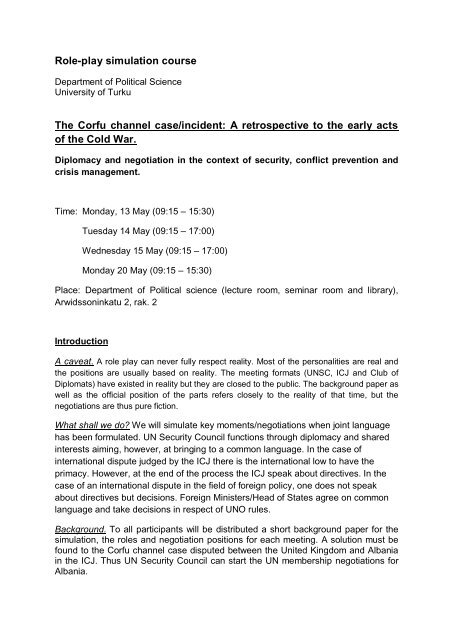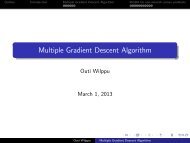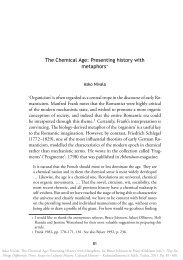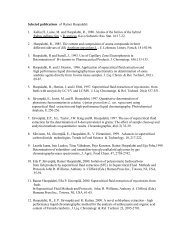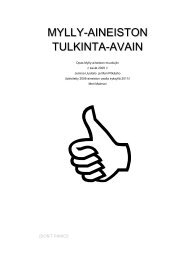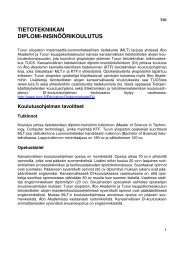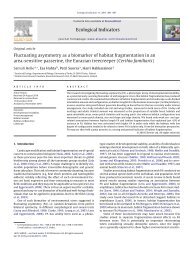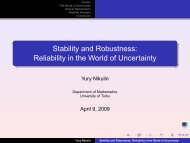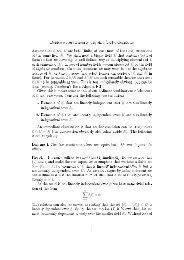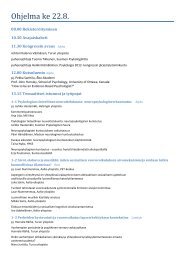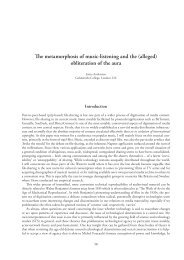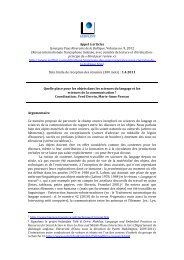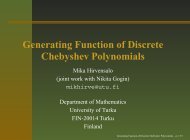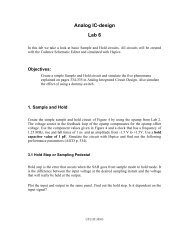Role-play simulation course The Corfu channel case/incident: A ...
Role-play simulation course The Corfu channel case/incident: A ...
Role-play simulation course The Corfu channel case/incident: A ...
Create successful ePaper yourself
Turn your PDF publications into a flip-book with our unique Google optimized e-Paper software.
<strong>Role</strong>-<strong>play</strong> <strong>simulation</strong> <strong>course</strong>Department of Political ScienceUniversity of Turku<strong>The</strong> <strong>Corfu</strong> <strong>channel</strong> <strong>case</strong>/<strong>incident</strong>: A retrospective to the early actsof the Cold War.Diplomacy and negotiation in the context of security, conflict prevention andcrisis management.Time: Monday, 13 May (09:15 – 15:30)Tuesday 14 May (09:15 – 17:00)Wednesday 15 May (09:15 – 17:00)Monday 20 May (09:15 – 15:30)Place: Department of Political science (lecture room, seminar room and library),Arwidssoninkatu 2, rak. 2IntroductionA caveat. A role <strong>play</strong> can never fully respect reality. Most of the personalities are real andthe positions are usually based on reality. <strong>The</strong> meeting formats (UNSC, ICJ and Club ofDiplomats) have existed in reality but they are closed to the public. <strong>The</strong> background paper aswell as the official position of the parts refers closely to the reality of that time, but thenegotiations are thus pure fiction.What shall we do? We will simulate key moments/negotiations when joint languagehas been formulated. UN Security Council functions through diplomacy and sharedinterests aiming, however, at bringing to a common language. In the <strong>case</strong> ofinternational dispute judged by the ICJ there is the international low to have theprimacy. However, at the end of the process the ICJ speak about directives. In the<strong>case</strong> of an international dispute in the field of foreign policy, one does not speakabout directives but decisions. Foreign Ministers/Head of States agree on commonlanguage and take decisions in respect of UNO rules.Background. To all participants will be distributed a short background paper for the<strong>simulation</strong>, the roles and negotiation positions for each meeting. A solution must befound to the <strong>Corfu</strong> <strong>channel</strong> <strong>case</strong> disputed between the United Kingdom and Albaniain the ICJ. Thus UN Security Council can start the UN membership negotiations forAlbania.
ROLE-PLAY: December ’46 – February ’49.<strong>The</strong> “<strong>Corfu</strong> <strong>channel</strong> <strong>case</strong>” has deeply involved in a diplomatic debate the UN Security Council. Inspring 1947, the UN Security Council decides to bring the <strong>case</strong> at the recently constitutedInternational Court of Justice, which will be activated for the first time in occasion of aninternational diplomatic crisis that potentially could threat the peace in Europe. However, inparallel with the ICJ process, the UN Security Council has to face the question of accession intoUNO of one of the countries involved to the “<strong>Corfu</strong> <strong>channel</strong> <strong>case</strong>”, Albania…Imaginary retro-scenario:<strong>The</strong> government of the United Kingdom is strongly decided to block the UNO membership forthe Socialist Republic of Albania before the conclusion of ICJ process. <strong>The</strong> UK also pretendsthat the Albanian government must pay reparation to the families of His Majesty’s soldierswho lost their lives at the <strong>incident</strong>, by claiming it to be a crime against humanity. Since then,the British government has decided to block also the Albanians Central Bank 1574 kg goldconfiscated by the Germans during WW2.On the other hand the Albanian government claims to have not any substantial connectionto the causes that provoked the <strong>incident</strong>. It continuously declares to have the right to receiveback the treasure confiscated by the Germans, as well as the right to be alongside othernations in the UNO. <strong>The</strong> Albanian government also refuses to pay any reparation to thefamilies of the British soldiers who lost their lives at the <strong>incident</strong>, since it pretends to be opento further investigation in the area that could confirm its innocence.Both parts have their allies in the UN Security Council and ICJ. Also both governments havetop secret documents in their hands that could not be shared with their respective allies. <strong>The</strong>British are afraid of the US position regarding Albania, which was be leaden by a differentlogic during and after the WW2. <strong>The</strong> Albanians cannot inform the Soviets regarding theirtruth position, since it could involve also Yugoslavia into the <strong>case</strong>. However, all actors havetheir truth and interests in this game…Real backgroundOn 15 May 1946 two Royal Navy ships, HMS Orion and HMS Superb, crossed the <strong>Corfu</strong> Channelfollowing a prior inspection and clearing of the strait. While crossing they came under fire fromfortifications situated on the Albanian coast. Although the ships suffered no material damage and nohuman casualties occurred, Britain issued a formal demand for "an immediate and public apology fromthe Albanian Government". Such apology was not forthcoming, however, and the Albanian Governmentclaimed that the British ships had trespassed in Albanian territorial waters.On 22.110.1946, a Royal Navy flotilla composed of cruisers HMS Mauritius and HMS Leander, and ofdestroyers HMS Saumarez and HMS Volage, was ordered northward of <strong>Corfu</strong> Channel with the
express orders to test the Albanian reaction to their right of innocent passage. <strong>The</strong> crews wereinstructed to respond if attacked. <strong>The</strong>y were passing close to the Albanian coast in what theyconsidered to be a mine-free zone with Mauritius leading and Saumarez following closely. Near the bayof Saranda, just prior to 3 p.m., the destroyer Saumarez struck a mine and was heavily damaged. Atapproximately 4:16 p.m., while towing, Volage struck a mine also and sustained heavy damage. Bothships' bows were completely blown off and adverse weather conditions in the straits made the towingeffort exceedingly difficult with both ships sailing stern-first, but after twelve hours of effort both shipsmanaged to reach the <strong>Corfu</strong> harbor. Forty-four men died and forty-two were injured in the <strong>incident</strong>. <strong>The</strong>Albanian coastal batteries did not fire during this <strong>incident</strong>.On November 12 – 13, 1946, the Royal Navy carried out an additional mine sweeping operation in the<strong>Corfu</strong> <strong>channel</strong>, codenamed Operation Retail. It was then discovered that the mines were of Germanorigin but they were free of rust and marine growth. <strong>The</strong>y were also freshly painted and their mooringcables were recently lubricated. <strong>The</strong> mine-sweeping operation took place within Albanian territorialwaters, but without authorization by the Albanian government which pretended to have no mineinstallationcapacity to its costal guard arsenal.On 9.12.1946 UK sent a note to the Albanian government accusing Albania of laying the mines anddemanding reparations for the May and October <strong>incident</strong>s. Britain demanded a reply within fourteendays, mentioning that in the event of a negative Albanian response the matter would be referred to theUN Security Council. <strong>The</strong> Albanian government in its reply of 21.12.1946, denied the British allegationsand went on to elaborate that the whole affair was the work of countries which did not wish to see anormalization of relations between Albania and Britain, and in fact vessels from Greece and othercountries had trespassed recently in the area where the mines were discovered.Implementation.<strong>The</strong> role-<strong>play</strong> <strong>simulation</strong> will consist on a four day intensive <strong>course</strong>.Day 1 st , May 13 (09:15 – 15:30)9:15 – 9:30, Introduction to the role-<strong>play</strong> <strong>simulation</strong>s <strong>course</strong>.9:30 – 10:15, Lecture on Real Background.Coffee break.10:30 – 11:30, Lecture on Power, Diplomacy, Negotiations and Security.11:30 - 13:00 Lunch break13:00 – 14:00, What are we doing (implementation of RPS).Coffee break.
14:15 – 15:30, Who is who? (separation of the roles, secret documents and strategy)Day 2 nd , May 14 (x2 sessions, 09.15 – 17:00)Session 1, 9:15 – 11:45, three separate groups/rooms. 10:30 – 10:45 coffee breakICJ group (Case 1: if Albania has any responsibility regarding the mines and if theAlbanian government is obligated to pay reparations). (seminar room / teacher x)9:15 – 10:30 Listening session: the United Kingdom (present also the diplomats ofAlbania, URSS and SFRJ)10:45 – 12:00 listening session, the Socialist Republic of Albania (present also thediplomats of USA, UK and Greece)UN Security Council group (lecture room / teacher y)9:15 – 10:30 general discussion of situation (present the Albanian delegation)10:45 – 12:00 discussions on including or not Greece into the UNSC meetingsClub of Diplomats group (library / teacher w)9:15 – 10:30 discussions among diplomats from USA, UK, Greece and France10:45 – 12:00 discussions among diplomats from USSR, Albania, SFRJ and France12:00 – 14:15 lunch breakSession 2, 14:15 – 17:00, two separate groups/rooms. 15:30 – 15:45 coffee breakICJ group (seminar room / teacher x)14:15 – 15:30 confrontation about technical argumentations between the parts(including interested diplomats)15:45 – 17:00 final discussions and conclusions of the court (in private).UN Security Council group (lecture room / teacher y – w)14:15 – 15:30 debates on taking in considering or not the question advanced by theAlbanian government for an eventual UNO membership before the conclusions ofICJ.15:45 – 17:00 final discussions on the formulation of a day final draft.
Day 3 rd , May 15 (x2 sessions, 09:15 – 17:00)Session 1, 9:15 – 11:45, three separate groups/rooms. 10:30 – 10:45 coffee breakICJ group (Case 2: Does the action of His Majesty’s naval forces constitutes aviolation of the Albanian territorial sovereignty?) (seminar room / teacher x)9:15 – 10:30 listening session the Socialist Republic of Albania (present alsodiplomats of USA, UK and Greece).10:45 – 12:00 listening session the United Kingdom (present also diplomats ofAlbania, URSS, SFRJ).UN Security Council group (lecture room / teacher y)9:15 – 10:30 general debate on the issue.10:45 – 12:00 technical discussion and argumentations following the conclusions ofICJ.Club of Diplomats group (library / teacher w)9:15 – 10:30 discussion among diplomats of URSS, Albania SFRJ and France.10:45 – 12:00 discussions among diplomats of USA, UK, Greece and France.12:00 – 14:15 lunch breakSession 2, 14:15 – 17:00, two separate groups/rooms. 15:30 – 15:45 coffee breakICJ group (seminar room / teacher x)14:15 – 15:30 confrontation about technical argumentations between the parts(including interested diplomats).15:45 – 17:00 final discussions and conclusions by the court (in private).UN Security Council group (lecture room / teacher y – w)14:15 – 15:30 debates regarding the international position of Albania following theBritish and Greek opinions.15:45 – 17:00 final discussions on the formulation of a day final draft.


